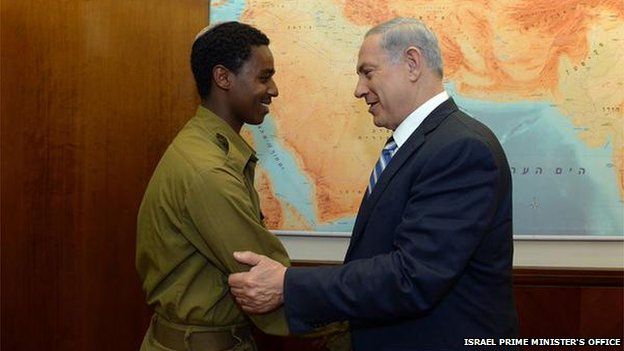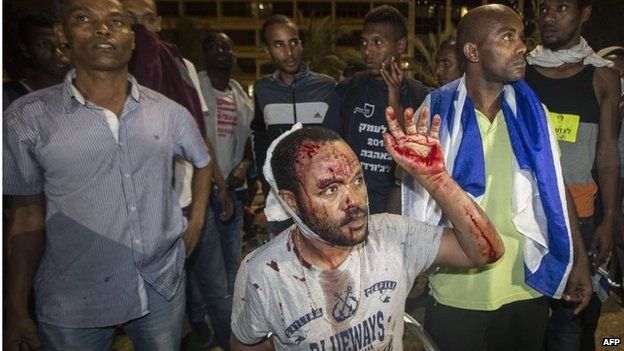
Mr Netanyahu met soldier Damas Pakedeh, who was beaten by two Israeli policemen
Israel's prime minister has said
racism in the country must be eliminated, after protests by Ethiopian
Israelis against alleged discrimination.
Benjamin Netanyahu spoke
after meeting Ethiopian Israeli community leaders and an Ethiopian
Israeli soldier, whose beating by police has fuelled tensions.A protest by Ethiopian Israelis on Sunday ended in clashes with police.
Israel's president said the community's grievances "revealed an open and raw wound" at the heart of Israeli society.
"We must look directly at this open wound," Reuven Rivlin added. "We have erred. We did not look, and we did not listen enough."
At least 46 police and seven demonstrators were hurt in the clashes which followed the protest in Tel Aviv on Sunday night, officials said. Dozens of protesters were arrested, police said.
Call for unity
On Monday, Mr Netanyahu met Israeli soldier Damas Pakedeh, who was beaten by two police officers in a suburb of Tel Aviv last week.Afterwards, Mr Netanyahu met Ethiopian Israeli leaders in an effort to reassure the community.
"We must stand together as one against the phenomenon of racism, to denounce it and eliminate it," he said.
One of the policemen involved in Mr Pakedeh's beating has been dismissed and the other suspended from the force, Israeli police spokesman Micky Rosenfeld told the BBC.
An investigation into the incident is under way.
Tear gas
The protests on Sunday started peacefully but became more violent as night fell.
Police fired tear gas and stun grenades and officers on horseback charged the crowd to try to disperse it.
Analysis: Kevin Connolly, BBC News, Jerusalem
President Reuven Rivlin was quick to respond to the weekend's disturbances with calming words - the country hadn't listened to its Ethiopian minority, he said.It is listening today at least.
The police used considerable force to disperse the rioting crowds in Tel Aviv but the government is seeking to send a simultaneous signal that it recognises the strength of the Ethiopian minority's grievance about racism and discrimination in jobs and education.
It is an awkward twist in what began as a triumphant story for Israel which began with one of Zionism's most exotic initiatives - a series of airlifts dating back to the 1980s which brought to Israel members of a religious minority with Jewish roots.
As black migrants from a country with a poorly-developed educational system, though, they have struggled to integrate into Israeli society and they have been left feeling that their treatment has never quite matched the imagination and generosity of the impulse which brought them here.
Ethiopian Jews' income is considerably lower than the general population, and they are much more likely to face limited educational opportunities and to end up in prison, according to The Ethiopian National Project, a non-governmental organisation which assists Ethiopian Jews in Israel.
Tens of thousands of Ethiopian Jews were airlifted to Israel in secret operations in the 1980s and 1990s to escape famine and civil war. There are now around 135,000 Ethiopian Jews living in Israel.
No comments:
Post a Comment